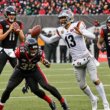Key Takeaways:
- MLB's stringent gambling suspensions, including a lifetime ban for Tucupita Marcano, highlight the sport's ongoing battle against betting.
- Rule 21(d) and Attachment 61 are central to MLB's gambling policy, aiming to maintain the integrity of the game.
- The evolving legal landscape of gambling in the U.S. and MLB's partnerships with gambling entities may prompt a reevaluation of these policies.
Major League Baseball (MLB) has recently made headlines with its decisive action against players involved in gambling, marking a significant moment in the sport's ongoing effort to preserve its integrity. Among those penalized, San Diego Padres prospect Tucupita Marcano received a lifetime ban, underscoring the severity with which MLB views infractions of its gambling policies. This move has reignited discussions around the sport's historical stance on gambling and its implications for the future.
At the heart of MLB's gambling policy are two critical pieces of legislation: Rule 21(d) of MLB's own rules and bylaws, and Attachment 61 of the Basic Agreement negotiated between the owners and the MLB Players Association. Rule 21(d) is notorious for its role in the lifetime suspensions of players like Shoeless Joe Jackson and Pete Rose, setting a clear precedent for the consequences of betting on one's own games. Attachment 61 serves to expand upon this foundation, aiming to adapt to the evolving landscape of legal gambling and its potential impacts on the sport.
The rapid proliferation of legalized gambling in the U.S., coupled with MLB's partnerships with legal gambling outlets and casinos, has blurred the once-clear line between betting and baseball participation. This shift has prompted discussions on whether MLB's gambling policies require updating to reflect the current legal and cultural climate, especially as the current Basic Agreement approaches its expiration after the 2026 World Series.
Players caught gambling face a rigorous disciplinary process outlined in the Basic Agreement, including the right to grievance proceedings. However, once suspensions are publicly announced, the grievance process has concluded, leaving players with no further recourse. The rules are clear: betting on baseball, especially on games in which a player has a duty to perform, is strictly forbidden and carries severe penalties, including lifetime bans.
Despite these restrictions, the legalization of sports betting in multiple states since 2018 has introduced new challenges. MLB and other professional sports leagues have embraced revenue opportunities related to legalized gambling, creating a complex dynamic that tests the boundaries of existing policies. Players are permitted to bet on other sports, provided they do so legally, highlighting the nuanced approach MLB takes toward gambling in general.
Education plays a crucial role in MLB's strategy to address these challenges. The union and MLB engage in annual discussions with players about gambling, emphasizing the importance of awareness and adherence to the rules. Attachment 61, in particular, outlines the educational initiatives designed to inform players about the gambling landscape, including emerging technologies and the implications of sponsorships and government investigations.
However, there is no formal program addressing gambling addiction among players, leaving a gap in the support system that mirrors those for drug use and domestic violence. This lack of a collectively bargained gambling policy suggests an area ripe for discussion in future collective bargaining negotiations.
As MLB continues to navigate the complex interplay between sports and gambling, the recent suspensions serve as a stark reminder of the importance of maintaining the integrity of the game. With legal and cultural attitudes toward gambling evolving, MLB faces the challenge of adapting its policies to ensure that the sport remains untainted by the potential influence of betting, while also recognizing the realities of a changing landscape.










